The Rest
Playing Doctor
by John Walker on Apr.03, 2006, under The Rest
I need your help.
My cough is so incredibly painful that I’m going insane.
I haven’t the energy to walk anywhere, but have to do something about the barbed wire encased stinging nettles currently on fire in my neck before I claw my own throat out.
Tell me your remedies. If pharmaceutical, I’ll find arrangements.
Especially something that will let me sleep.
In Her Eyes – Final
by John Walker on Mar.30, 2006, under The Rest
She has been alive for one week, but still three weeks early for the world. She is too small, too unfinished, encased within her plastic box. The air is filled with electric bleeps and the hiss of refined oxygen. Her shrivelled skin is not yet ideal, her hands too small, her eyes unopened. She has no consciousness of her situation, inside her plastic box.
There is the unheard sobbing, endless desperate cries. There is a weakness to the sound, the tone of exhaustion, those dry cracked noises. Unheard by ears too small to understand, and those too far away.
***
She is standing astride the wretched divide of life and death. She rules it.
She is at the apex of living, the peak, the most alive any human has ever been, and will ever be. To be more alive than this would mean to cease being human, to explode beyond. But she was to be the highest human of all, to reign in this place. To ascend. She would become ordinary among the immortals. But she was also to be human, more human and more extraordinary than any around her.
She is also alive in flame.
She is also about to win. She is about to defeat her final enemy.
The WUMP… WUMP… WUMP… is now alone in daring to challenge her.
***
It is a significant day. It is a significant moment in a significant day. It is a moment that is life defining, life changing.
It is smaller than so many memories but far more momentous. It is more crucial, but small enough to miss.
This moment shines.
***
Broken pieces, fragments of ideas. The sub-atomic particles of thought. Stretching narratives. Stolen glimpses. So it goes.
All her life the WUMP… WUMP… WUMP… had ruled her. Had controlled her. Had forced her mind, directed her, bullied her, mocked her, held its tyrannical authority over her, laughed at her weakness and belittled her existence. Spiteful, hateful noise. Cruel noise. Dominant. Her whole life had been a puppet’s dance to its rhythm. It will end. It will not win. It cannot be allowed to win. No more.
***
She is encased in the box, her cries can’t be heard. Her body is too fragile.
***
Now: Victory.
***
WHUMP WHUMP WHU-
Pyschonauts Review 2005
by John Walker on Mar.29, 2006, under The Rest
Kieron has declared today to be Official Psychonauts Reviews Posting Day. Who am I to argue?
Here is my original Psychonauts review from PC Gamer, a year ago when it was first meant to be coming out, as opposed to the second one last November when it was, er, second supposed to appear. (It finally came out in February this year – buy it, you fool). It’s the unsubbed version, so expect mistakes.
Psychonauts
Get your brain in gear, it’s time to mess with your mind.
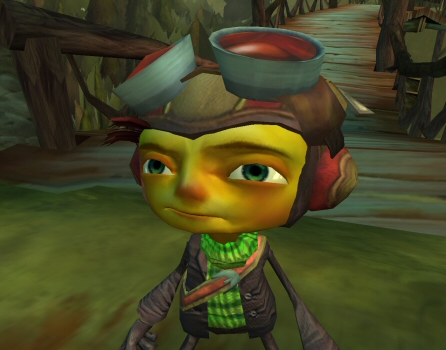
Developer Double Fine is the home of hero of the 90s, Tim Schafer. After learning his trade by script writing for the early Monkey Island games, he went on to create what must be recognised as the finest adventure games to have existed, Day of the Tentacle and Grim Fandango. Back then, Schafer did something special to a fine format. He looked at adventure games, and he decided to make a new rule: Everything has to be Game. If an object was present in a scene, then there must be a unique gag for looking at it, picking it up, using it, even talking to it. “I’m sorry, I can’t do that” was not an acceptable response. If the player could think of it, it was to be met with a written reply. Every scene was poured over, explored and experimented with, raising a joy that can only be known when recognising someone had thought of you when they made this. Please, get excited. He’s done the same for platform games.
Don’t be fooled. Psychonauts is not a kid’s game. It’s a game about being a kid. Yes, it is Nickelodeon coloured; yes, you play a ten year old boy; and yes, it’s a platform game. But it’s time to shed your prejudices, shake off your assumptions, and come fresh-faced to a game that’s going to raise you above its shoulders and carry you around town.
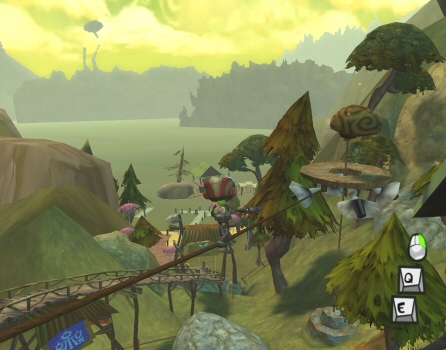
I’ll be honest. For the first half hour I was disappointed. Despite a thoroughly entertaining introductory cutscene, introducing Razputin, a young kid gate-crashing a summer camp for psychic children, it was all over too soon and I was left assigning buttons on my gamepad so I’d be able to jump, punch and move the camera without losing fingers (after an abruptly aborted foray into the hopeless mouse/keyboard controls). It felt typical, and it didn’t feel anything special. The initial training level doesn’t engross, dutifully introducing all the basic obstacles and simplest moves in a ‘Nam environment. There are too many interruptions, too much happening at once, and it all feels like the insane saccharine rush of flailing through a Crash Bandicoot level. Please, play past this.
Games only occasionally have the kind of moments that follow. The first came when exploring the cabin area where the children sleep. A few of the vast cast of fellow psi-campers were hanging around, having conversations. Really funny conversations. Mostly about kid stuff, but with that sense of universal importance that ten year olds understand their worlds by. But one was on his own, his head pressed to a building. I ‘used’ him to talk, and he explained that he was waiting to watch the girls getting changed through a hole in the wall. He was that kid at camp. I went to ‘use’ him again, but accidentally hit the wrong button, and smacked him with Raz’s whopping great psi-punch. But I didn’t lose a life, receive a warning message, or watch him ignore my violence. Instead, his head was pushed through the tiny hole, leaving his tubby body and little legs waggling off the ground. I dashed inside, and there was his head, stuck through, dazed and confused. And there, in that moment, there’s a rush. The realisation that something far more involved is happening here. And it wasn’t a fluke. Everything is Game. Punch someone, jump on someone, and there’s a unique reply, natural to their character, relevant to your action. As the game progresses you gain more psychic powers, including telekinesis and pyrokinesis. Lift them off the ground, set them on fire, there’s something new. And we haven’t even left the opening area yet.
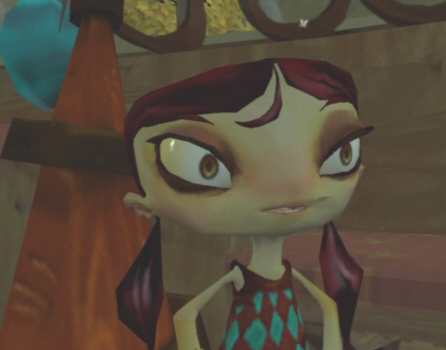
The game unfolds in two ways. There’s the campsite, which is enormous, all freely explorable, riddled with hidden extras, and packed with gags like nothing before. It hints at opportunities to come, and these locations change as you progress through the game’s other half, the cranial sections. A psychonaut, you see, is someone who enters another’s mind, Fantastic Voyage style. That opening training level was inside Coach Oleander’s mind – a military war vet, obsessed with the action he’d faced in his youth. A world apart from the next, the insides of mysterious Agent Nein’s brain, a neat orderly. Which is a world apart from the beautiful Agent Vodello, and her 70’s disco reality. All worlds apart from the giant mutated lungfish who swallows Lili, the Tim Burton inspired girl who might be your girlfriend were she not inside a fish.
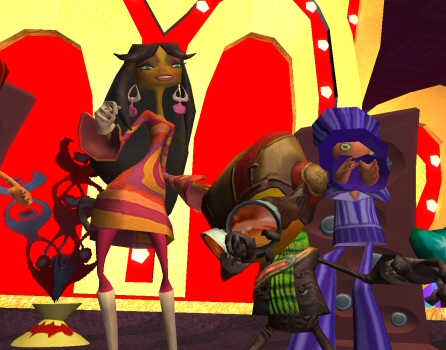
Each mind has a series of tasks to be completed, which at first are the fairly standard combination of reaching destinations, and collecting items. These collectables include mental cobwebs (to be vacuumed up), figments of the imagination, and labels for the weeping suitcases (emotional baggage – ho ho), which are exchanged back in the camp for psi cards, the tokens that allow you to gain new powers. There’s also arrow heads to be dug up in the camp grounds which are used to purchase items from the camp store. And unlike every other platform game ever, the shop is for real. You don’t have to buy all the stuff it sells – I finished the game without ever finding out what the magnet does.
As things progress, events take a turn for the worse (i.e. there’s a plot), and it becomes a matter of necessity that you enter minds, rather than for the previous summer camp training programme. People’s brains are going missing, leaving the rest of the kids zombie-like, wandering around the place mumbling, “Teee Veeeeee”. Someone has to do something, and with the aid of the retired Agent Cruller, it’s up to Raz. Fairly obviously.
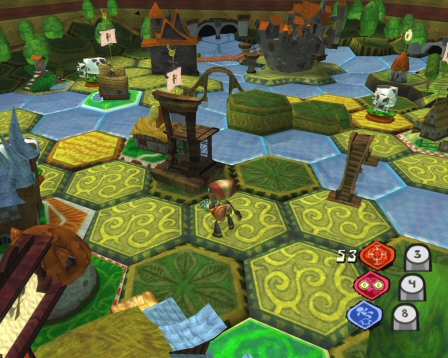
So far, so cute. Original, certainly, and involved. But there’s more than just that going on. The second revealing moment came when inside Agent Nein’s head. Another of the goals is to unlock memories that are locked up in safes. The safe scampers around scared until you punch it open, letting you see a brief slide show of static sepia-toned memories of the host. Until this point these have been funny rewards for a completed task. First picture is a young Nein playing with his mum. The second the mum and dad looking concerned. The third shows his dad looking scared at his mum lying in bed. The fourth the funeral. The fifth Nein and his father unable to communicate. Laughter stops. Jaw drops. This isn’t a game for kids.
This becomes more evident when stomping around Lungfishopolis (the mind of the lungfish – this still makes me laugh out loud) a giant Godzilla-sized version of yourself, punching over buildings, climbing skyscrapers, and swiping aeroplanes from the sky. A breakaway group of lungfish militia realise you’re there to help, and arrange to meet you by the dam. You have to clear the area of enemies first. And as you crash your way through this huge city, amazed by realising that this could be a game by itself, there are news flashes, spreading propoganda about you. One informs the city’s citizens that you are often to be found “popping pills and soliciting inexpensive call-girls.” This isn’t a game for kids.
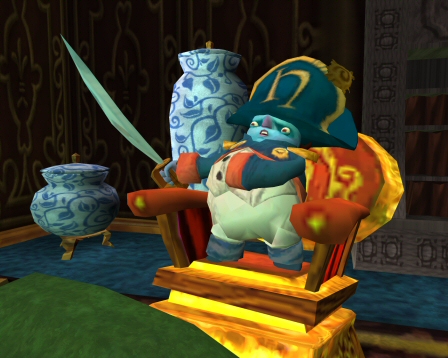
About halfway through the 15 to 20 hours of play, the sheer volume of brilliant jokes slows, and the game develops a greater maturity. Fittingly enough, it becomes cerebral. For example: for reasons best discovered you meet a man with a very literal Napoleonic complex – a split personality in conflict. Entering his mind reveals a drawing room, at its centre the two halves of his personality sat either side of a table-top strategy game. They are playing for domination. Raz jumps into the game and shrinks down, from where he can move the pieces to play against Napoleon, moving them with his telekinesis power. But there aren’t enough pieces on your side, so you shrink down further, and knock on the doors of the houses within, convincing people to help. Each gives a platforming quest to be completed before they will. Game inside game inside game inside game. (And through the upstairs window of one building, you can see a drawing room, two men sat either side of a table-top strategy game). That’s one surprise spoiled – there’s no way I’m ruining any more. But please believe me when I say that each incredible, unique notion is strong enough to have been a game on its own.
The game just falls shy of a shiny 90% due to a really fundamental issue with its edge detection. Much swearing occurred when huge sections had to be re-climbed innumerous times thanks to a particularly awkward jump, and Raz’s ensueing failure to grip ledges. Brilliantly the game is never so cruel as to kill you, but you will see some sections so many times. It’s such a simple thing, but it’s fundamental – it does so much damage to enjoyment. And blood pressure. There are also a few aesthetic bugs, mostly with the sound, music vanishing, and snippets of dialogue too quiet to be heard no matter the volume settings. Niggles, but important ones. But not nearly important enough to stop you from getting hold of this.
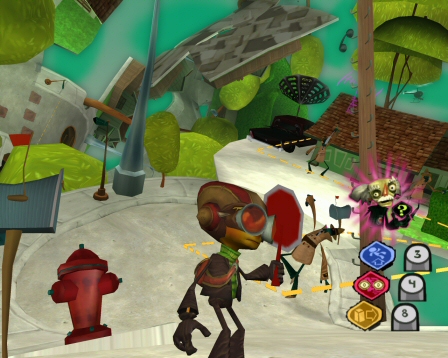
I feel evangelistic about my desire to have you play it. You’re a gamer, and as such this is something you should see. Not only is it exquisitely beautiful, each level receiving a new graphical attitude, the character animations detailed beyond comprehension, but it’s so utterly special. There are more new ideas in here than a hundred Half-Life 2s, and it contains more laughs than any game before. It’s wonderful. Please, have a go.
Exquisite gaming, imaginative and hilarious.
In Her Eyes – Part 6
by John Walker on Mar.27, 2006, under The Rest
WUMP… WUMP… WUMP…
The skin on her left forearm split open – about an inch long – as the swelling of the blister burst. Others were welling up alongside it, the crisping surface preparing for more little eruptions. Each fine hair had let off a small popping sound as it frizzled to nothing, leaving the skin bare to the face of the heat. The nylon of her left trouser leg was melting, sealing itself to her thigh, the two bubbling together. Her ear cracked as her hair burned away.
***
There is a box. The box is clear, perfectly clear, as if it were the conjuring of a mime. It is sealed on all six sides, and she lies inside it.
***
The fire made a sound, like the crazed rush of a hurricane, fighting its way through a canyon. It roared a ferocious, destructive battlecry as it consumed. It was a magnificent beast, one of her own creation, and under her own control. Each burst, each new thread of flame, was her incantation. A puppet for her amusement.
The liquid skin on her arm now burned, a green-orange blaze, dancing so prettily. The flame danced for her, the servant entertaining her in her throne room. At her whim it leapt higher, then would sweep its way further towards her shoulder and arm, increasing its chorus line. She smiled, splitting open her cheek.
***
No sound can either enter or leave the box. She is naked. The energy for pounding against the box is drained completely, her hands now unable to make fists.
Her face is down, her chin pressed against her breastbone, her eyes open, staring. Both arms are wrapped around her knees, legs hugged to her breasts. She cradles herself, the slightest movement as she rocks forward and backward.
***
Her song, so powerful, drawn from her centre and exploding outwards, is beautiful. Her mouth, able to open so much wider without the restrictions of her left cheek, releases this ballad of joy. Her whole body dances to her tune, painted with the colours that only she has seen, all alight in their radiant flames. The sound still continues, still “WUMPS” within her, but it is fading, terrified. She will have victory.
Everything is alive in colour and sound. Everything performs its life-tune for her, and her alone. None other can see or hear them, none other has the skills to interpret their ways, and she reigns over them.
***
She would weep, but there are no tears.
In Her Eyes – Part 5
by John Walker on Mar.24, 2006, under The Rest
I’d be interested to hear people’s comments on this so far, positive or negative.
In Her Eyes – Part 5
WUMP… WUMP… WUMP…
It was bigger than her.
WUMP… WUMP… WUMP…
***
She is too hot. It is stifling, and the frantic fanning of her paperback book does nothing to cool her down. Instead it merely serves to encourage the sweat from her forehead to run into the corners of her eyes. An ideal afternoon by the lake now seems less than perfect, and she wonders at her endless capacity to always want for whatever it is that she currently does not have. Throughout the damp June she had moaned for sunnier days. Here they are, and she is wishing for just a single cloud in the sky
looking up, she notices she is no longer alone on the small grassy incline. A family of three are setting up a picnic, over-organised, and the daughter, maybe seven, far too well behaved. It looks uncomfortable, so she begins to carve out a story: It is the second-to-last chance for the stability of their family. The father has slept with his wife’s friend, and while it’s something he regrets with every jagged memory, his wife has not forgiven him at all. Perhaps if they can perform this family ritual, they can once again rediscover how to be united. Their daughter, her name shall be Cassie, knows that mum and dad aren’t as happy as they used to be, but she does not
with the back of his hand. She looks up, astonished, in utter disbelief, tears stinging the corners of her eyes. Her head is flushed red, red in anger, red in horror. She can feel the heat of her burning cheek, and a hand reaches up to touch it, as if to confirm that it has really happened. Her eyes are wide open, but she wants them to be narrow, narrowed to slits that would portray her anger. But they are wide open, and all she can show is fear. He looks scared too, but behind the fear she can still see that, the thing, the thing that had been just before he struck her. It had filled his eyes a moment ago, and now it was barely there, a flicker, less than that, at the back of his stare, almost obscured. But there. She cannot decide whether to scream or to run, whether to collapse or lash out. When he takes a gentle step toward her she is frozen. He suddenly looks sad, suddenly looks as if he is about to ask
just a bit more cold water. But her mother is too angry with her, and she isn’t acting normally. The water is stinging her legs and bare backside, but they are already late and she is covered in dirt from the garden where she had been told not to go, but had gone, because she had seen a rabbit, and it was sitting really still, and she really thought it might let her touch it, and then it had hopped away, and she slipped, and then she was all muddy even though they were already late. Her right thigh was still really sore from the smack, and now the bath water was so stingy too, and the water on the smack was making her cry, but crying only seemed to be making mummy angrier. She couldn’t stop and mummy was rubbing too hard with the flannel on her arms and she cried louder and it felt like it would never end and she wished that she hadn’t seen the rabbit because then they would already be in the car and mummy wouldn’t be so angry and her legs wouldn’t hurt and it would be
***
WUMP… WUMP… WUMP…
The walls looked as though they were on fire. But it was more complicated than that. If someone outside had been looking in, they would have said that the paint must have been burned by flames. But the walls weren’t on fire. The paint wasn’t on fire. It was the colour of the paint that burned.
She had set the colour ‘Apple White’ on fire.
It was beautiful craft. A fine carpenter could work an elaborate curve into the leg of an occasional table. But of course it was only structural. The carpenter was using physical tools to make geometric shapes that were pleasing to the eye. She was merely setting light to the moments of energy released as light’s photons met with the electrons of the paint. Each quantum burst igniting. This was within her control.
***
is seventeen and James is fumbling clumsily with the clasp of her bra. He kisses her neck as he attempts to undo this most simple of devices. She is at once entertained by his struggle and trembling inside every time his lips press against her skin. She has never felt this way, never this scared before, and as she looks around she realises that everyone else’s face shares the same expression as her own. The climate control has now completely stopped working, and the horrific thunder of the turbulence is blocking out the noise of people’s frantic yelling. Terror fills her as she realises she cannot even hear her own hysterical screams. She gasps, as his tongue touches her bottom lip, and his hand slides over her belly. Her face and chest are flushed red, almost prickly. She hasn’t felt this before, this desire, this tightening, making it more than she can bear to breathe, the air seeming too thick to take into her lungs. Someone falls into the aisle, someone else trips as they try to run, they tangle, him in her arms, her in his, holding each other, the moment paused, held in perfection, smooth backs under gentle fingers. She wants this time forever, to never end, with no idea how much longer she can survive
***
WUMP… WUMP… WUMP…
More than alive! It could be as loud as it wanted, but she was more than alive now!
WUMP… WUMP… WUMP…
Now see what you’ve done.
by John Walker on Mar.22, 2006, under The Rest
Brian will be a day late, due to something YOU did. I hope you’re sorry.
In Her Eyes – Part 4
by John Walker on Mar.19, 2006, under The Rest
So, after claims of putting this up as it was two years ago, I’ve changed my mind and gone through the last four parts tidying them up, and in the case of the last part, fixing it from a horrible mess.
In Her Eyes – Part 4
If she drilled straight down into a sphere – perpendicular to the surface – she would reach the centre. She had been drilling for days now.
The surface, that was where humans live. All of the mysterious, the phenomena, the ‘unexplained’: that was immediately beneath. All this searching for the paranormal, the desperation to learn of so-called powers beyond the regular, was so laughable. The various media so hopelessly scrabbling around, wanting to be the first to prove that there are psychic powers, that humans can do more than they believed. And all the time the answers were only one layer down.
Telekinesis – the ability to move things with the power of your mind. A “power”? Ridiculous. She had become bored of the act itself. Banging the fridge door around, days old as an talent, was childish and trivial. Destroying fruit, the puerile behaviour of the immature.
The vase – that still held the resonance of respectability. First of all, it wasn’t easy. And secondly, it came from a further layer beneath.
***
It’s a holiday. She’s twelve. She’s with both her parents in Spain. They’re staying in a chalet near the coast, and they’ve been there for four days now. Yesterday she was stung by a jellyfish, and the marks on her leg are still red and itchy. Less irritating than last night though, and certainly alright for running around on. She’s been out on the rocks by the cliff again, jumping from one to the next, seeing how fast she can go. Now she’s back for lunch, and this afternoon she’s going for a walk with her new friend, Richard, who is in the chalet three doors down. Richard is fourteen, and is also on holiday with both his parents. And he’s bored too.
They went for a walk yesterday, and they stopped on the rocks by the cliff. They had been throwing stones at the jellyfish floating off the shore, and after a while they got bored and sat on a rock. Richard asked her if she’d ever kissed a boy. She had said no. He put his hands in his lap, and she wanted him to kiss her.
This afternoon they were going for another walk, and she was sure this time that he would. She had never kissed anyone, but she really wanted to kiss Richard. He was sweet, and didn’t act like boys in her year at school. And he was fourteen! Two years older! She would be able to tell Helen, and Helen would be jealous.
She had gone back to the rocks last night, and it was then that she had slipped in and been stung by the jellyfish. She couldn’t wait to tell Richard about it, because the red stings looked amazing. She would show him the stings, and he would think that she was cool, and then they would kiss.
***
The anger was like nothing she had ever known. Surface layer anger is human: useless, mostly shouting and shaking, occasionally violent. Beneath the surface: more dangerous, unpredictable, the stuff of bad horror novels. But she was further down now, deep beneath, and anger was vast, alive, on fire. She could hear a deep thump, the noise of a bass amp two rooms away. It was regular, matching her heartbeat, beating in time with her. It was maddening her, mocking her. It knew her, knew her depth, knew the knowledge that was meant to be her secret. WUMP… WUMP… WUMP… Unstoppable, beyond her reach… perhaps even deeper.
She was livid, her mind screaming rage, her whole body clenched and shuddering. Why? Why couldn’t she control the beat?
***
Richard is already waiting. He’s outside her chalet, five minutes before they are supposed to meet, sitting on the grass, waiting for her to appear. She sees him before he sees her, and she half-skips over to him.
They are walking to the rocks, and she knows they are going to kiss. He looks nervous, and he’s more quiet than yesterday. On the rocks, she is showing him her legs. He is responding just right, admiring the red marks, interested and impressed. She sits next to him and before she even realises, she’s asking,
“Have you ever kissed a girl?”
He tells her he has, but only once. Then he gulps.
“I’d like to kiss you though.”
Eyes screwed tightly shut, mouths pursed and awkward, closed lips meet closed lips, pushing together, breaths held. It is the first kiss.
***
Fires ripped jagged tears around her. A plant on the windowsill, a jar of coffee by the kettle, three on the wooden table, one at the bottom of the curtains. The objects themselves weren’t burning, but instead the tears through them were. The flames alight with the colours from beneath, from beyond the surface, wild and furious.
The curtains did not catch light from the fire below them. There was no sudden eruption of blaze, no pillars of flames reaching to the ceiling, no bubbling paint on the wall around them. But the curtains were not surviving the fire either. As the flames met the material, it was gone, absorbed. It ceased to be. The fire did not burn, but engulfed, removing the very existence of the curtains, tearing at their reality. These flames had no tolerance for the surface. They took it away.
A Stark Contrast To Arcade-ia
by John Walker on Mar.18, 2006, under The Rest
In response to Stu’s excellent new feature on Grid Wars 2, I post this piece (formerly printed in PC Gamer). I’m specifically addressing this statement:
“The fact is, in the week or so your correspondent’s been playing Grid Wars 2, its abstract forms and events have been firing ideas and observations and thoughts into his head almost as much as they’ve been firing pretend laser blasts at geometric shapes, and this feature can only brush fleetingly across the surface of most of them lest it end up 20,000 words long. Not many books provide such mental stimulation, and certainly not a single “narrative-led” computer game ever has.”
This piece goes half way to capturing the significance of TLJ for me, and the extent of its influence. It’s also the longer version that was not run in the magazine, and hence has not been massaged by the word-headling hands of Tony Ellis.
The Longest Journey
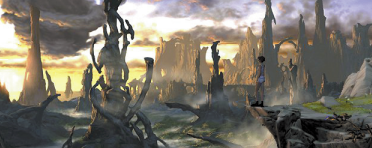
“Mystery is important. To know everything, to know the whole truth, is dull. There is no magic in that. Magic is not knowing, magic is wondering about what and how and where.”
The Longest Journey almost vanished away unnoticed, another obscurity ranted about by a few, but never reaching any acclaim. In the mire of millennial adventure gaming, it could so easily have been drowned by the density of its peers, ignored by pessimism, never given the chance it so strongly deserved. How it was joyously liberated from this fate is mysterious. And in mystery, there is magic. In The Longest Journey, there is magic.
As a point and click adventure, TLJ already defied conventions, ignoring the genre’s desperately floundering attempts at ‘catching up’. Developer Ragnar Tørnquist and Funcom understood that ‘catching up’ was meaningless – they had a story to tell, and a world in which it needed to be told, and so this was the game they made. The natural instinct to say how it recaptured the adventure’s previous glory is strong, but this just simply isn’t true. Adventure gaming had never been as glorious as The Longest Journey – it hadn’t ever even come close.
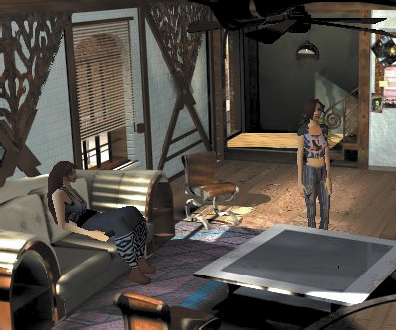
Eighteen year old art student April Ryan provides the most perfect eyes through which to witness this tale. Sceptical, sarcastic and sassy, she tight-rope walks the same line as Buffy, never quite tumbling into the annoying. And yet still somehow gets away with normally grating Ameriteenisms such as, “That’s SO not appropriate.” You forgive her, because you realise, as do the games’ twin worlds of Stark and Arcadia, that she’s important.
Tony Ellis was recently explaining to me how Silent Hill 4 manages to spook so effectively by blurring the two worlds of the normal, and the horrific. When an element of one leaks into the other, stability in the known is shaken, and fear drip, drip, drips in. In April Ryan’s life, it is the fantastic that begins to disturb the normality of her existence, the world of dreams invading the world of rationale and science. And as a good horror shows you fear in the every day, The Longest Journey shows you magic. Set 200 years in the future, April’s world is enough like our own to allow us to identify, but distant enough to allow its status as a metaphor.
The meta-narrative tells of how, long ago, the united Earth was divided into two: Science and Magic, Stark and Arcadia. The Bladerunner-inspired future version of our world allows the effects of this severance to have been demonstrated even more starkly than they are now in 2004. Wars have increased global apartheid, Capitalism’s punishments are more prevalent, and people get on with being people as it happens around them. It is unavoidably our future.
In contrast, Arcadia refers back to so many fantasy lands, simplicity bolstered by magic, thus creating seismic instability and inevitable fracture. But Arcadia at least possesses hope. Stark’s worldview is blind, eyes gouged out by its people’s own hands. It allows the coming destruction of Chaos without even the consciousness to question. And so it is through April’s dreams, through her powerful imagination, that she is drawn to ‘shift’ out of that world, and to learn her part in the shaping of the future.
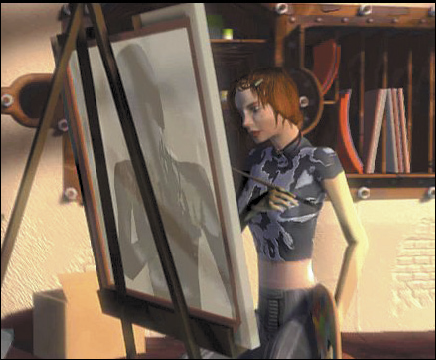
I was unaware of how much I’ve been influenced by The Longest Journey, until returning to its tale for this piece. I’ve been writing a children’s story, on and off, for a couple of years, never getting very far with it, but always driven to persist by its unstoppable urge to leave my head. I’m now wondering how much I have to remove because I’ve simply plagiarised it from my subconscious. The ideology of this game is lodged deeply inside me, partly because I so strongly identified with the message I took from it, and partly because that message is so powerfully told. It is always a point and click adventure. There are always daft clicking the rubber duck on the clamp and tying it to the string puzzles. And it works with these elements, not despite them. Not every voice is perfectly cast, but most are. Yes, there is swearing, but there is swearing where real people swear. And oh wow, are the conversations long. But they are telling you a story like no other.
The opening quote, said to April by her mentor when she is pestering him for answers, speaks for the whole game. The Longest Journey is epic and magnificent, but completion makes you aware that this is only a tiny fraction of a created world. Indeed, these are only weeks in the whole of April Ryan’s lifetime. So much remains unknown. But to know the whole truth is dull. Magic is in not knowing, magic is wondering about what and how and when.
Escapist – A Word Is Worth A Thousand Pictures
by John Walker on Mar.17, 2006, under The Rest
Narrative is our link to the universe.
Visceral immediacy is sold to us as a reminder that we are “alive.” It is stimulation, a release of epinephrine from the adrenal medulla, increasing heart rate, dilating pupils, elevating blood sugar levels. It’s a deception – a brief, drug-induced elevation above the norm. Story is the narration of our truth.
New piece up on the Escapist, in which I quote stuff and write and you know stuff and that sort of thing.
In Her Eyes – Part 3
by John Walker on Mar.16, 2006, under The Rest
It hasn’t snowed. If it had, it would have been something too close to perfect. As it is, cold, clear, sharply blue, it paints a flawed and beautiful background.
This afternoon she has things she must do, responsibilities that must be met. But this morning, this crisp morning, is all hers. Some days, in these circumstances, she would be frustrated by this empty space. Today it is time in which she wants to do nothing but float.
There is a hill, a horizon with promises of woods, and any number of paths to walk on. The hill possesses caves on its hidden side, the woods contain trees she would have climbed ten years ago and fallen trunks she will walk along today. It is the day on which she will have the idea that at first seemed childish and silly, but would one day be realised. It is the day she will make her mind up, although she won’t realise for many weeks.
***
It had become peculiar that ideas – their conception, their evaluation, and their implementation – had been performed in so many stages. So many insecurities. Had it been fear, paranoia, immaturity? Now matured, to have an idea was to realise the idea. To formulate was to deliver. The ridiculous constraints of time had been shaken off: time only offered the opportunity for doubt – doubt that did not exist before the addition of time.
There was the apple. The idea was that the apple should be destroyed, pulled apart from the middle outwards. And so it was. All those shackles of, “how?”, of, “am I capable?”, were rusting, broken. The idea was that the fridge door should be ripped from its hinges, smashed on the tiled floor. And so it was.
The idea was that things should change colour. Not the primitive colours that had, in hindsight, been boring her so deeply. The real colours. The colours she could bend and shape, the colours she could feel and breathe. By the sink was the vase in which she had arranged wild flowers, before. The flowers were now long dead, brown wisps drying to the sides, but the vase remained a cerulean blue. This blue was of course still weak, a washed out blue of the world, so now she offered it the colour that she held inside her.
Real blue wove into the layers of the worldly blue, twisting itself in veins through the fabric of the vase. Eruptions occurred all over, depth blossoming, swelling the nature of the material, opening it, exploring it, regenerating it. And now it stood majestic, a vessel of awe in amongst the flat existence of the surface upon which it stood. And then it was red.
The idea, the delivery of the idea. It was green. It was blue again. It was a wild orange. It was the sweetest honey. It was jade, silver, white. It was liquid. It was a pool, melted, destroyed.
***
Seventh birthday. The first that will be remembered into adulthood. All her friends are here, her parents trying to maintain control of eleven children while conducting party games. They are sitting in a circle, a parcel is being passed. Each time the music stops another layer of paper is torn away, each time there’s a sweet, each time getting closer to the big prize at the centre. They are all taking longer and longer to pass the parcel on, as now they are realising that this will make them more likely to win. It will be a few years still before the prizes are replaced with forfeits, and the tactic reversed.
Her best friend wins, and this is ok, because although it would have been nicest if it had been her, at least it was Sarah. Sarah has won a car that when you pull it back on the floor, it goes forward by itself. This is ok too, because she already has one of these, and it’s the same colour anyway.
Food is being served, and she’s hungry. She’s been watching the food be prepared all day long, and hasn’t been allowed to eat any of it. Not even a little sausage. Now she’s allowed, and she’s filling her plate high with more than she’ll manage. Her friends are doing the same, except for Laura who doesn’t like any of it. And now she is eating, liking the taste of everything apart from the cheese and pineapple things because the cheese is Cheddar and she hates Cheddar. Someone has spilt a drink. Both parents are running over with cloths and paper because the drink is red and the carpet is beige and everyone is pointing at the red puddle and gasping. Then someone points in the other direction and squeals.
Jamie is kneeling on the table, and he’s unwrapping the presents. Her presents! All the presents her party friends had brought and her mum had put on the table for later, and now he’s already unwrapped three of them! Her dad stays to catch the red fizz, and her mum spins around and hooks James under the armpits and pulls him from the table, wrapping paper still in his hands. She is crying now, and she is crying as hard as she can, because nothing this unfair has ever happened to anyone.
***
The remains of the vase lost her attention, molten china evacuating from the puddle in thin rivulets towards the edge of the counter, perhaps red, perhaps blue. The first stream gently ran over the curved edge and began a steady spattering on the floor.